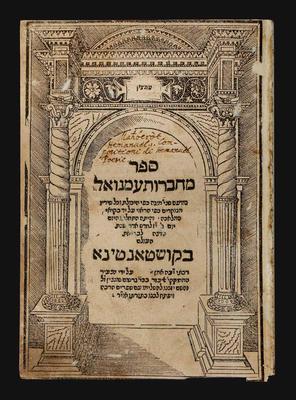Immanuel Ben Shelomoh
Sefer Machbereth ‘Immanu‘el...
Costantinople, ben Gersom Soncino Eliezer, 1535.4° (187 x 130 mm). [156] leaves. Hebrew type. Foliation in the upper margin, in an early hand. Title-page within elaborate woodcut architectural border. Disbound, red edges. Preserved in a modern half-morocco box, author's name and imprint lettered in gilt on the spine. On the title-page the annotation ‘Mahberòt Hemanuèl Compositioni di Hemanuel Poesie.', in a late sixteenth- or early seventeenth-century hand. A good copy, some leaves uniformly browned, minor repairs to the title-page and outer lower corners of some leaves, without any loss. Waterstaining and spotting in places, occasional soiling. On the verso of the title-page the inked note ‘N° 1118', in an early hand.
Provenance: a member of the Ricasoli family (on the verso of the title-page stamp with the inscription ‘cano. flore. pandvlphi de ricasolis baronibvs'; a second stamp with a crown surmounting a coat of arms with a cross; Livio Ambrogio collection.
Second edition of the poetical collection by ‘Immanu‘el ben Šhelomoh (1261-1332 ca.), first published by Geršom Soncino in 149. This edition was printed by his son Eli‘ezer in Constantinople, where he had moved in 1558. The poet ‘Immanu‘el ben Šhelomoh – orImmanuel the Jew, also known in Italian as Manoello Giudeo – was born in Rome, then lived in different towns of the central Italy – such as Perugia, Fabriano, Fermo, Camerino – and in Verona, while Dante was still living here. The last part of the Machbereth contains the short poem Ha-Tofet ve-ha-Eden (The Hell and Paradise), an account of his journey through Hell and Paradise. The influence of Dante's poem is evident, and numerous episodes from the Commedia have served as a model.


